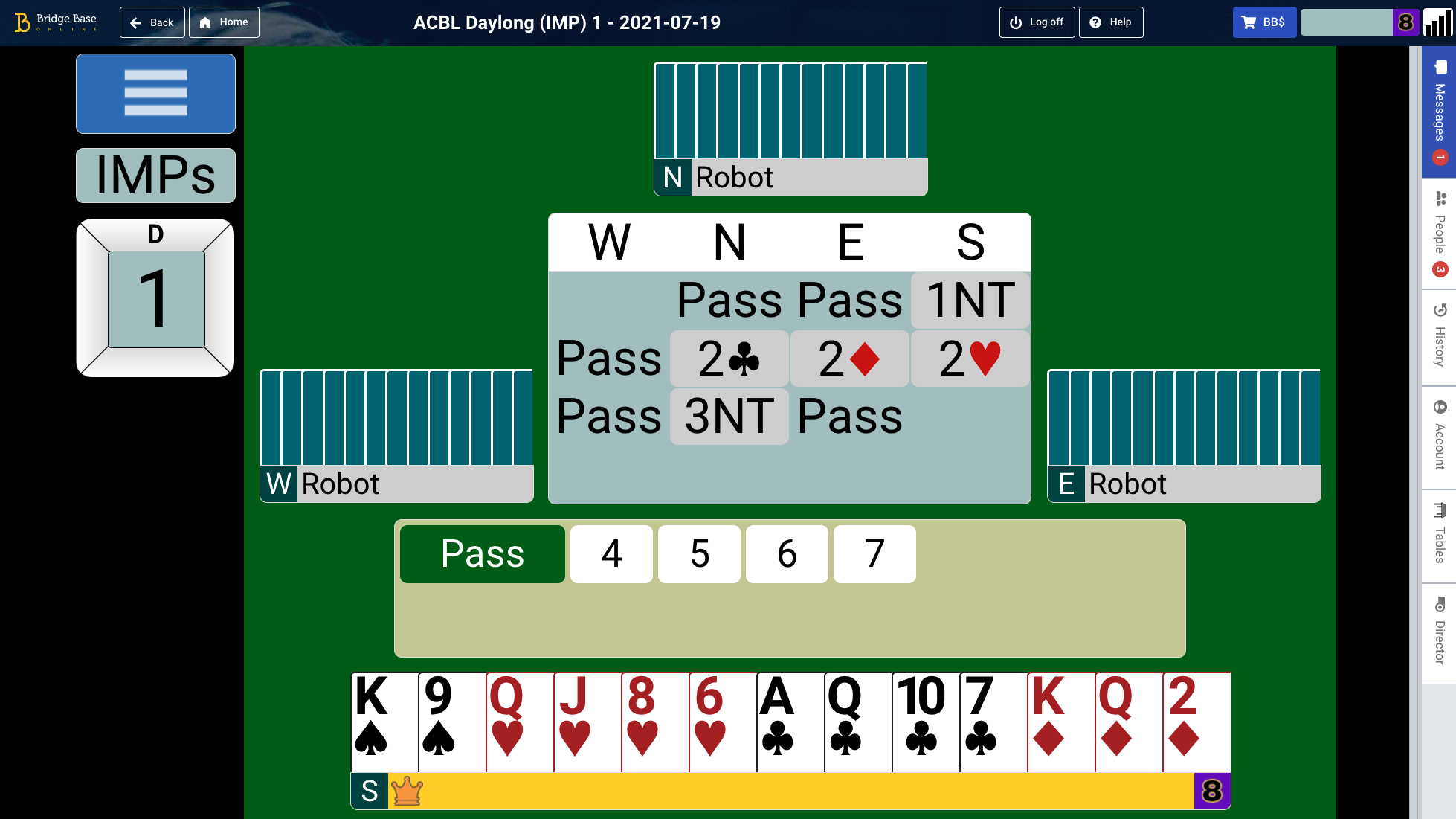|
Fantunes
In the game of contract bridge Fantunes is a natural bidding system initially developed Carlos Mosca and popularized by Fulvio Fantoni and Claudio Nunes - two players that were later found to be cheating and were banned from play by many bridge federations The Fantunes system differs in approach from other bidding systems used by world class bridge players. Opening bids of one and two of a suit are stronger than in most systems, with one level suit openings natural and forcing one round, and constructive two-level openings. The one notrump opening denotes a balanced or semi-balanced hand with 12-14 HCP which can include a singleton or a five-card major suit. Opening one of a suit is natural but forcing, unlimited in strength that contains at least 14 high-card points (HCP). An exception is made for opening 1 or 1 with as little as 11 HCP when holding five cards in the bid suit and four cards in the other major. For an example of such a "light" opening bid, holding , second seat wi ... [...More Info...] [...Related Items...] OR: [Wikipedia] [Google] [Baidu] |
Fulvio Fantoni
Fulvio Fantoni (born 9 November 1963) is an Italian international bridge player. He is a six-time world champion, a World Grand Master of the World Bridge Federation (WBF), and the WBF first-ranked player as of December 2011. He is one of 10 players who have won the Triple Crown of Bridge. Fantoni was born in Grosseto. November 1963, Fantoni says that he has lived "practically since I was born" in Ostia, in the coastal district of Rome. His regular partner for many years is Claudio Nunes, the second-ranked World Grand Master (April 2011). Nunes also lives in Ostia and they see each other socially. They play " Fantunes", for their surnames, an innovative bidding system characterised by natural but forcing one-level opening bids in all four suits. The pair was implicated in a cheating scandal in 2015 resulting in sanctions against them, only some of which were negated by appeals. Emigration to Monaco Since 2011 Fantoni and Nunes are full-time members of a team led and paid by ... [...More Info...] [...Related Items...] OR: [Wikipedia] [Google] [Baidu] |
Claudio Nunes
Claudio Nunes (born 23 March 1968) is an Italian professional bridge player. He is a five-time world champion, a World Grand Master of the World Bridge Federation (WBF), and the WBF second-ranked player as of April 2011. He is one of 10 players who have won the Triple Crown of Bridge. Nunes was born in Rome. His regular partner for many years is Fulvio Fantoni, the first-ranked World Grand Master (April 2011). Fantoni-Nunes are generally regarded as one of the top pairs worldwide. They play " Fantunes", for their surnames, an innovative bidding system characterised by natural but forcing one-level opening bids in all four suits. The pair was implicated in a cheating scandal in 2015 resulting in sanctions against them. Emigration to Monaco Starting in 2011, Fantoni and Nunes were full-time members of a team led and paid by the Swiss real-estate tycoon Pierre Zimmermann, under contract expiring 2016. From 2012 all six members would be citizens of Monaco and the team would ... [...More Info...] [...Related Items...] OR: [Wikipedia] [Google] [Baidu] |
Contract Bridge
Contract bridge, or simply bridge, is a trick-taking card game using a standard 52-card deck. In its basic format, it is played by four players in two competing partnerships, with partners sitting opposite each other around a table. Millions of people play bridge worldwide in clubs, tournaments, online and with friends at home, making it one of the world's most popular card games, particularly among seniors. The World Bridge Federation (WBF) is the governing body for international competitive bridge, with numerous other bodies governing it at the regional level. The game consists of a number of , each progressing through four phases. The cards are dealt to the players; then the players ''call'' (or ''bid'') in an auction seeking to take the , specifying how many tricks the partnership receiving the contract (the declaring side) needs to take to receive points for the deal. During the auction, partners use their bids to also exchange information about their hands, including o ... [...More Info...] [...Related Items...] OR: [Wikipedia] [Google] [Baidu] |
Forcing Bid
In the card game contract bridge, a forcing bid is any that obliges the partner to bid over an intermediate opposing pass. Owing to the partnership's bidding system or a bridge convention, partner must "keep the bidding open", i.e. not pass, thereby preventing his left-hand opponent from ending the auction with a pass and enabling the "forcing bidder" to bid further. A forcing bid that creates no further obligation is called ''forcing for one round''. A bid that is ''forcing and promises a rebid'' creates an obligation on the forcing bidder next round (typically, up to some level of the auction). A ''game forcing'' bids creates a mutual obligation to continue bidding at least to game level, or to double the opponents. All bridge bidding systems use forcing bids. For instance, one over one and two over one responses to one-of-a-suit opening bids are treated as forcing in almost all bidding systems. Also, introducing a new suit at three level is generally treated as forcing prov ... [...More Info...] [...Related Items...] OR: [Wikipedia] [Google] [Baidu] |
Hand Evaluation
In contract bridge, various bidding systems have been devised to enable partners to describe their hands to each other so that they may reach the optimum contract. Key to this process is that players evaluate and re-evaluate the trick-taking potential of their hands as the auction proceeds and additional information about partner's hand and the opponent's hands becomes available. Hand evaluation methods assess various features of a hand, including: its high card strength, shape or suit , , fit with partner, quality of suits and quality of the whole hand. The methods range from basic to complex, requiring partners to have the same understandings and agreements about their application in their bidding system. Basic point-count system Most bidding systems use a basic point-count system for hand evaluation using a combination of high card points and distributional points, as follows. High card points First published in 1915 by Bryant McCampbell in ''Auction Tactics'' (page 26), the ... [...More Info...] [...Related Items...] OR: [Wikipedia] [Google] [Baidu] |
Takeout Double
In the card game contract bridge, a takeout double is a low-level conventional call of "Double" over an opponent's bid as a request for partner to bid his best of the unbid suits. The most common takeout double is after an opponent's opening bid of one of a suit where the double shows a hand with opening values, support for all three unbid suits (at least three cards in each) and shortness in the suit doubled (preferably, no more than two). Normally, the partner of the doubler must bid his best suit but may pass if (a) his right hand opponent intervenes or (b) on the more rare occasions when his hand is such that he wishes to convert the takeout double to a . Requirements Commonly a double is considered for takeout whenever one of the following conditions is met (but see balancing double below): *Opponents have previously bid only one suit, and the player did not have chance to double that suit before. *Opponents have previously bid two suits, and partner has passed. *Opponents ... [...More Info...] [...Related Items...] OR: [Wikipedia] [Google] [Baidu] |
Bridge Base Online
Bridge Base Online (BBO) is the world's largest bridge-playing online platform, with about 10 million monthly visits, as of November 2021. Originally created by professional bridge player Fred Gitelman, BBO was first published by Bridge Base, Inc. in 2001, as a Windows downloadable software, offering free online multiplayer bridge rooms for practice and play. Around 2008, BBO was ported to a web application to also support Linux and macOS users, as well as mobile devices. In 2018, Bridge Base Online was inducted to the American Contract Bridge League's Hall of Fame, for its long-term commitment to bridge. As of February 2022, BBO was the only organization ever inducted by the Hall of Fame. BBO was acquired by th52 Entertainmentgroup in December 2018, and Fred Gitelman retired from the company in July 2019. Main Features In addition to bridge rooms for casual play and teaching, BBO hosts many types of duplicate bridge tournaments, including events sanctioned by official bridge ... [...More Info...] [...Related Items...] OR: [Wikipedia] [Google] [Baidu] |
Gambling 3NT
In the card game contract bridge, Gambling 3NT is a special of an opening of 3NT. The bid is used to describe a hand containing a minor suit of at least seven cards in length and headed by the ace, king and queen, at minimum. The bid has the dual objectives of preempting the opponents' bidding should they hold the and trying for a game in notrump on the gamble that partner might hold adequate support. Because this conventional bid replaces the standard use of opening 3NT (a hand with 25-27 high card points and a balanced distribution), partnerships must use other bids to show the standard 3NT hand. For partnerships which also employ the use of the strong two club convention, that bid can be used to describe a standard 3NT opening hand. For example, the following bidding sequence: replaces the traditional 3NT opening bid if gambling 3NT and strong two club is in use. That is, North's hand is best described as 25 to 27 high card points and a balanced distribution. Respons ... [...More Info...] [...Related Items...] OR: [Wikipedia] [Google] [Baidu] |
Blackwood Convention
In the partnership card game contract bridge, the Blackwood convention is a bidding convention developed by Easley Blackwood in 1933 and still widely used in the modern game. Its purpose is to enable the partnership to explore its possession of aces, kings and in some variants, the queen of trumps to judge whether a slam would be a feasible contract. The essence of the convention is the use of an artificial 4NT bid made under certain conditions to ask partner how many aces he has; responses by partner are made in step-wise fashion to indicate the number held. Blackwood's original summary After developing the concept in 1933, Easley Blackwood submitted an article proposing his slam-seeking convention to ''The Bridge World'' magazine but it was rejected.Blackwood (1949), page 192. Nevertheless, it gained awareness and use amongst players and was written about by several authors. In his own first publication on the convention in 1949, Easley Blackwood comments on the entries in books b ... [...More Info...] [...Related Items...] OR: [Wikipedia] [Google] [Baidu] |

.jpg)

